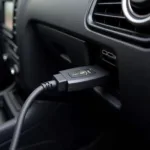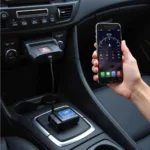When it comes to car maintenance and diagnostics, having a reliable OBD2 scanner is crucial. This is especially true for European car owners, as these vehicles often require specialized scanners to access their sophisticated onboard computer systems. But with so many different European OBD2 scanners on the market, finding the right one for your needs can be overwhelming.
Understanding European OBD2 Scanners
European OBD2 scanners, also known as EOBD scanners, are specifically designed to work with vehicles sold in the European market. While all modern cars share the standard OBD2 port, European cars often utilize manufacturer-specific protocols and data streams that require a compatible scanner for comprehensive diagnostics.
These scanners provide access to a wealth of information about your vehicle’s health, from engine performance data to emissions system status. This data can be invaluable for diagnosing problems, monitoring maintenance needs, and even improving fuel efficiency.
Why Choose a Dedicated European OBD2 Scanner?
While generic OBD2 scanners can read basic engine codes from European cars, they often lack the depth and functionality to fully diagnose and troubleshoot issues specific to these vehicles.
A dedicated European OBD2 scanner can:
- Access manufacturer-specific codes: Uncover hidden issues that generic scanners might miss.
- Perform advanced diagnostics: Go beyond basic code reading to perform tasks like ABS bleeding, airbag system resets, and more.
- Provide live data streams: Monitor real-time sensor data for in-depth analysis and troubleshooting.
- Offer coding and programming capabilities: Unlock hidden features or customize vehicle settings (for advanced users).
Key Features to Look for in a European OBD2 Scanner
Selecting the right European OBD2 scanner depends on your specific needs and budget. Here’s a breakdown of key features to consider:
1. Vehicle Coverage:
- Make and Model Compatibility: Ensure the scanner supports your specific car make and model.
- Year Range: Check if the scanner is compatible with your car’s manufacturing year.
2. Functionality:
- Code Reading and Clearing: Basic functionality to read and clear diagnostic trouble codes.
- Live Data Streaming: View real-time sensor data for advanced diagnostics.
- Bi-Directional Control: Perform tests and activate components for in-depth troubleshooting.
- Special Functions: Look for features like ABS bleeding, DPF regeneration, injector coding, etc., based on your needs.
3. Connectivity:
- Wired vs. Wireless: Wired scanners offer a stable connection, while wireless options provide greater flexibility.
- Bluetooth vs. WiFi: Bluetooth is suitable for personal use, while WiFi offers wider range and potential for workshop use.
4. User Interface:
- Screen Size and Resolution: A clear and easy-to-read display is crucial for interpreting data.
- Intuitive Navigation: Look for a user-friendly interface with logically organized menus.
- Multilingual Support: Choose a scanner that supports your preferred language.
5. Software and Updates:
- Regular Updates: Ensure the manufacturer provides regular software updates to maintain compatibility with newer vehicles.
- Data Logging and Reporting: The ability to log data and generate reports can be helpful for tracking issues and sharing information.
Choosing the Right Scanner for You
The ideal European OBD2 scanner for you depends on your individual requirements.
- DIY Enthusiasts: A basic to mid-range scanner with code reading, live data, and possibly some special functions should suffice. Look for user-friendly interfaces and affordable options.
- Professional Mechanics: A high-end scanner with comprehensive vehicle coverage, advanced diagnostics, bi-directional control, and extensive special functions is essential. Prioritize robust software, reliable updates, and potential for future expandability.
European OBD2 Scanners: A Worthwhile Investment
Investing in a quality European OBD2 scanner is a smart decision for any European car owner. It empowers you with the knowledge and tools to take control of your vehicle’s maintenance, diagnose problems accurately, and potentially save on costly repair bills.
Remember to research carefully, compare features and prices, and choose a scanner that best suits your specific needs and budget.
Frequently Asked Questions (FAQ)
1. Can I use a generic OBD2 scanner on my European car?
While generic scanners can read basic engine codes, they might not access manufacturer-specific codes or advanced diagnostics.
2. What are some popular European OBD2 scanner brands?
Reputable brands include Launch X431 V+ Android OBD2, Autel, Foxwell, and more.
3. How often should I use my European OBD2 scanner?
It’s recommended to scan your vehicle periodically, especially if the check engine light illuminates or you experience performance issues.
4. Can I update my European OBD2 scanner?
Most reputable scanners offer software updates. Check the manufacturer’s website for instructions and availability.
5. Are European OBD2 scanners difficult to use?
Many scanners come with user-friendly interfaces. However, it’s essential to choose a scanner that aligns with your technical expertise.
6. Can a European OBD2 scanner help me improve fuel efficiency?
Yes, by monitoring live data and identifying potential issues that affect fuel consumption.
7. Where can I find more information about the best OBD2 scanner for Japanese and European vehicles?
For comprehensive reviews and comparisons, visit OBDFree, your trusted source for OBD2 scanner information.
Need help?
Contact us via WhatsApp: +1(641)206-8880, Email: [email protected]. Our customer support team is available 24/7.


